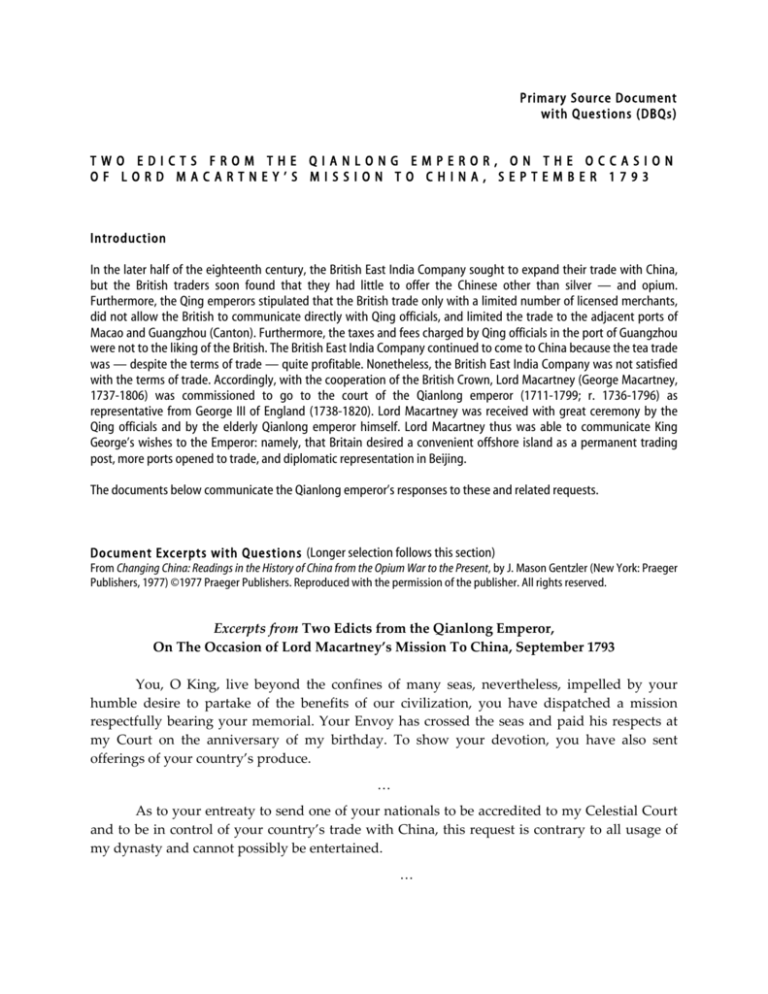
Primary Source Document
with Questions (DBQs)
TWO EDICTS FROM THE QIANLONG EMPEROR, ON THE OCCASION
OF LORD MACARTNEY’S MISSION TO CHINA, SEPTEMBER 1793
Introduction
In the later half of the eighteenth century, the British East India Company sought to expand their trade with China,
but the British traders soon found that they had little to offer the Chinese other than silver — and opium.
Furthermore, the Qing emperors stipulated that the British trade only with a limited number of licensed merchants,
did not allow the British to communicate directly with Qing officials, and limited the trade to the adjacent ports of
Macao and Guangzhou (Canton). Furthermore, the taxes and fees charged by Qing officials in the port of Guangzhou
were not to the liking of the British. The British East India Company continued to come to China because the tea trade
was — despite the terms of trade — quite profitable. Nonetheless, the British East India Company was not satisfied
with the terms of trade. Accordingly, with the cooperation of the British Crown, Lord Macartney (George Macartney,
1737-1806) was commissioned to go to the court of the Qianlong emperor (1711-1799; r. 1736-1796) as
representative from George III of England (1738-1820). Lord Macartney was received with great ceremony by the
Qing officials and by the elderly Qianlong emperor himself. Lord Macartney thus was able to communicate King
George’s wishes to the Emperor: namely, that Britain desired a convenient offshore island as a permanent trading
post, more ports opened to trade, and diplomatic representation in Beijing.
The documents below communicate the Qianlong emperor’s responses to these and related requests.
Document Excerpts with Questions (Longer selection follows this section)
From Changing China: Readings in the History of China from the Opium War to the Present, by J. Mason Gentzler (New York: Praeger
Publishers, 1977) ©1977 Praeger Publishers. Reproduced with the permission of the publisher. All rights reserved.
Excerpts
from
Two
Edicts
from
the
Qianlong
Emperor,
On
The
Occasion
of
Lord
Macartney’s
Mission
To
China,
September
1793
You,
O
King,
live
beyond
the
confines
of
many
seas,
nevertheless,
impelled
by
your
humble
desire
to
partake
of
the
benefits
of
our
civilization,
you
have
dispatched
a
mission
respectfully
bearing
your
memorial.
Your
Envoy
has
crossed
the
seas
and
paid
his
respects
at
my
Court
on
the
anniversary
of
my
birthday.
To
show
your
devotion,
you
have
also
sent
offerings
of
your
country’s
produce.
…
As
to
your
entreaty
to
send
one
of
your
nationals
to
be
accredited
to
my
Celestial
Court
and
to
be
in
control
of
your
country’s
trade
with
China,
this
request
is
contrary
to
all
usage
of
my
dynasty
and
cannot
possibly
be
entertained.
…
Primary Source Document with Questions (DBQs) on
TWO EDICTS FROM THE QIANLONG EMPEROR,
ON THE OCCASION OF LORD MACARTNEY’S MISSION TO CHINA, SEPTEMBER 1793
You,
O
King
from
afar,
have
yearned
after
the
blessings
of
our
civilization,
and
in
your
eagerness
to
come
into
touch
with
our
converting
influence
have
sent
an
Embassy
across
the
sea
bearing
a
memorial.
I
have
already
taken
note
of
your
respectful
spirit
of
submission,
have
treated
your
mission
with
extreme
favour
and
loaded
it
with
gifts,
besides
issuing
a
mandate
to
you,
O
King,
and
honouring
you
with
the
bestowal
of
valuable
presents.
Thus
has
my
indulgence
been
manifested.
…
Hitherto,
all
European
nations,
including
your
own
country’s
barbarian
merchants,
have
carried
on
their
trade
with
Our
Celestial
Empire
at
Canton.
Such
has
been
the
procedure
for
many
years,
although
Our
Celestial
Empire
possesses
all
things
in
prolific
abundance
and
lacks
no
product
within
its
borders.
There
was
therefore
no
need
to
import
the
manufactures
of
outside
barbarians
in
exchange
for
our
own
produce.
But
as
the
tea,
silk,
and
porcelain
which
the
Celestial
Empire
produces
are
absolute
necessities
to
European
nations
and
to
yourselves,
we
have
permitted,
as
a
signal
mark
of
favour,
that
foreign
hongs1
should
be
established
at
Canton,
so
that
your
wants
might
be
supplied
and
your
country
thus
participate
in
our
beneficence.
But
your
Ambassador
has
now
put
forward
new
requests
which
completely
fail
to
recognize
the
Throne’s
principle
to
“treat
strangers
from
afar
with
indulgence,”
and
to
exercise
a
pacifying
control
over
barbarian
tribes,
the
world
over.
…
Your
Ambassador
requests
facilities
for
ships
of
your
nation
to
call
at
Ningpo,
Chusan,
Tientsin
and
other
places
for
purposes
of
trade.
Until
now
trade
with
European
nations
has
always
been
conducted
at
Macao,
where
the
foreign
hongs
are
established
to
store
and
sell
foreign
merchandise.
Your
nation
has
obediently
complied
with
this
regulation
for
years
past
without
raising
any
objection.
In
none
of
the
other
ports
named
have
hongs
been
established,
so
that
even
if
your
vessels
were
to
proceed
thither,
they
would
have
no
means
of
disposing
of
their
cargoes.
Furthermore,
no
interpreters
are
available,
so
you
would
have
no
means
of
explaining
your
wants,
and
nothing
but
general
inconvenience
would
result.
For
the
future,
as
in
the
past,
I
decree
that
your
request
is
refused
and
that
the
trade
shall
be
limited
to
Macao.
Questions:
1. Into what Chinese institutional framework is the Qianlong emperor forcing
relations with the British? How does this compare with the British
assumptions about how relations between different countries should be
carried out?
2. Think in terms of the Qianlong emperor’s point of view: Why should the
positions laid forth here seem reasonable to him?
3. Can you think of any reasons that the Qianlong emperor could have
reasonably known at the time (i.e., not things you know in hindsight) that
should have inclined him to accept some or all of the British requests? If so,
what might the arguments against those reasons be?
Trading
firms
licensed
by
the
Chinese
government.
1
Asia for Educators l Columbia University l http: //afe.easia.columbia.edu
Page 2 of 7
Primary Source Document with Questions (DBQs) on
TWO EDICTS FROM THE QIANLONG EMPEROR,
ON THE OCCASION OF LORD MACARTNEY’S MISSION TO CHINA, SEPTEMBER 1793
4. Why do you think it is important for diplomats to understand the worldview
of the other party? Would it have been possible for the British in 1793 to
change their request in order to get more of what they wanted? If so, how? If
not, why not?
Complete Documents
From Changing China: Readings in the History of China from the Opium War to the Present, by J. Mason Gentzler (New York: Praeger
Publishers, 1977) ©1977 Praeger Publishers. Reproduced with the permission of the publisher. All rights reserved.
Two
Edicts
from
the
Qianlong
Emperor,
On
The
Occasion
of
Lord
Macartney’s
Mission
To
China,
September
1793
[Edict
I]
You,
O
King,
live
beyond
the
confines
of
many
seas,
nevertheless,
impelled
by
your
humble
desire
to
partake
of
the
benefits
of
our
civilization,
you
have
dispatched
a
mission
respectfully
bearing
your
memorial.
Your
Envoy
has
crossed
the
seas
and
paid
his
respects
at
my
Court
on
the
anniversary
of
my
birthday.
To
show
your
devotion,
you
have
also
sent
offerings
of
your
country’s
produce.
I
have
perused
your
memorial:
the
earnest
terms
in
which
it
is
couched
reveal
a
respectful
humility
on
your
part,
which
is
highly
praiseworthy.
In
consideration
of
the
fact
that
your
Ambassador
and
his
deputy
have
come
a
long
way
with
your
memorial
and
tribute,
I
have
shown
them
high
favour
and
have
allowed
them
to
be
introduced
into
my
presence.
To
manifest
my
indulgence,
I
have
entertained
them
at
a
banquet
and
made
them
numerous
gifts.
I
have
also
caused
presents
to
be
forwarded
to
the
Naval
Commander
and
six
hundred
of
his
officers
and
men,
although
they
did
not
come
to
Peking,
so
that
they
too
may
share
in
my
all‑
embracing
kindness.
As
to
your
entreaty
to
send
one
of
your
nationals
to
be
accredited
to
my
Celestial
Court
and
to
be
in
control
of
your
country’s
trade
with
China,
this
request
is
contrary
to
all
usage
of
my
dynasty
and
cannot
possibly
be
entertained.
It
is
true
that
Europeans,
in
the
service
of
the
dynasty,
have
been
permitted
to
live
at
Peking,
but
they
are
compelled
to
adopt
Chinese
dress,
they
are
strictly
confined
to
their
own
precincts
and
are
never
permitted
to
return
home.
You
are
presumably
familiar
with
our
dynastic
regulations.
Your
proposed
Envoy
to
my
Court
could
not
be
placed
in
a
position
similar
to
that
of
European
officials
in
Peking
who
are
forbidden
to
leave
China,
nor
could
he,
on
the
other
hand,
be
allowed
liberty
of
movement
and
the
privilege
of
corresponding
with
his
own
country;
so
that
you
would
gain
nothing
by
his
residence
in
our
midst.
Moreover,
Our
Celestial
dynasty
possesses
vast
territories,
and
tribute
missions
from
the
dependencies
are
provided
for
by
the
Department
for
Tributary
States,
which
ministers
to
their
wants
and
exercises
strict
control
over
their
movements.
It
would
be
quite
impossible
to
leave
Asia for Educators l Columbia University l http: //afe.easia.columbia.edu
Page 3 of 7
Primary Source Document with Questions (DBQs) on
TWO EDICTS FROM THE QIANLONG EMPEROR,
ON THE OCCASION OF LORD MACARTNEY’S MISSION TO CHINA, SEPTEMBER 1793
them
to
their
own
devices.
Supposing
that
your
Envoy
should
come
to
our
court,
his
language
and
national
dress
differ
from
that
of
our
people,
and
there
would
be
no
place
in
which
he
might
reside.
It
may
be
suggested
that
he
might
imitate
the
Europeans
permanently
resident
in
Peking
and
adopt
the
dress
and
customs
of
China,
but,
it
has
never
been
our
dynasty’s
wish
to
force
people
to
do
things
unseemly
and
inconvenient.
Besides,
supposing
I
sent
an
Ambassador
to
reside
in
your
country,
how
could
you
possibly
make
for
him
the
requisite
arrangements?
Europe
consists
of
many
other
nations
besides
your
own:
if
each
and
all
demanded
to
be
represented
at
our
Court,
how
could
we
possibly
consent?
The
thing
is
utterly
impracticable.
How
can
our
dynasty
alter
its
whole
procedure
and
regulations,
established
for
more
than
a
century,
in
order
to
meet
your
individual
views?
If
it
be
said
that
your
object
is
to
exercise
control
over
your
country’s
trade,
your
nationals
have
had
full
liberty
to
trade
at
Canton
for
many
a
year,
and
have
received
the
greatest
consideration
at
our
hands.
Missions
have
been
sent
by
Portugal
and
Italy,
preferring
similar
requests.
The
Throne
appreciated
their
sincerity
and
loaded
them
with
favours,
besides
authorizing
measures
to
facilitate
their
trade
with
China.
You
are
no
doubt
aware
that,
when
my
Canton
merchant,
Wu
Chaop’ing,
was
in
debt
to
the
foreign
ships,
I
made
the
Viceroy
advance
the
monies
due,
out
of
the
provincial
treasury,
and
ordered
him
to
punish
the
culprit
severely.
Why
then
should
foreign
nations
advance
this
utterly
unreasonable
request
to
be
represented
at
my
Court?
Peking
is
nearly
10,000
li
from
Canton,
and
at
such
a
distance
what
possible
control
could
any
British
representative
exercise?
If
you
assert
that
your
reverence
for
Our
Celestial
dynasty
fills
you
with
a
desire
to
acquire
our
civilization,
our
ceremonies
and
code
of
laws
differ
so
completely
from
your
own
that,
even
if
your
Envoy
were
able
to
acquire
the
rudiments
of
our
civilization,
you
could
not
possibly
transplant
our
manners
and
customs
to
your
alien
soil.
Therefore,
however
adept
the
Envoy
might
become,
nothing
would
be
gained
thereby.
Surveying
the
wide
world,
I
have
but
one
aim
in
view,
namely,
to
maintain
a
perfect
governance
and
to
fulfill
the
duties
of
the
State;
strange
and
costly
objects
do
not
interest
me.
If
I
have
commanded
the
tribute
offerings
sent
by
you,
O
King,
are
to
be
accepted,
this
was
solely
in
consideration
for
the
spirit
which
prompted
you
to
dispatch
them
from
afar.
Our
dynasty’s
majestic
virtue
has
penetrated
unto
every
country
under
Heaven,
and
Kings
of
all
nations
have
offered
their
costly
tribute
by
land
and
sea.
As
your
Ambassador
can
see
for
himself,
we
possess
all
things.
I
set
no
value
on
objects
strange
or
ingenious,
and
have
no
use
for
your
country’s
manufactures.
This
then
is
my
answer
to
your
request
to
appoint
a
representative
at
my
Court,
a
request
contrary
to
our
dynastic
usage,
which
would
only
result
in
inconvenience
to
yourself.
I
have
expounded
my
wishes
in
detail
and
have
commanded
your
tribute
Envoys
to
leave
in
peace
on
their
homeward
journey.
It
behoves
you,
O
King,
to
respect
my
sentiments
and
to
display
even
greater
devotion
and
loyalty
in
the
future,
so
that,
by
perpetual
submission
to
our
Throne,
you
may
secure
peace
and
prosperity
for
your
country
hereafter.
Besides
making
gifts
(of
which
I
enclose
a
list)
to
each
member
of
your
Mission,
I
confer
upon
you,
O
King,
valuable
presents
in
excess
of
the
number
usually
bestowed
on
such
occasions,
including
silks
and
curios—a
list
of
which
is
likewise
enclosed.
Do
you
reverently
receive
them
and
take
note
of
my
tender
goodwill
towards
you!
A
special
mandate.
Asia for Educators l Columbia University l http: //afe.easia.columbia.edu
Page 4 of 7
Primary Source Document with Questions (DBQs) on
TWO EDICTS FROM THE QIANLONG EMPEROR,
ON THE OCCASION OF LORD MACARTNEY’S MISSION TO CHINA, SEPTEMBER 1793
[Edict
II]
You,
O
King
from
afar,
have
yearned
after
the
blessings
of
our
civilization,
and
in
your
eagerness
to
come
into
touch
with
our
converting
influence
have
sent
an
Embassy
across
the
sea
bearing
a
memorial.
I
have
already
taken
note
of
your
respectful
spirit
of
submission,
have
treated
your
mission
with
extreme
favour
and
loaded
it
with
gifts,
besides
issuing
a
mandate
to
you,
O
King,
and
honouring
you
with
the
bestowal
of
valuable
presents.
Thus
has
my
indulgence
been
manifested.
Yesterday
your
Ambassador
petitioned
my
Ministers
to
memorialize
me
regarding
your
trade
with
China,
but
his
proposal
is
not
consistent
with
our
dynastic
usage
and
cannot
be
entertained.
Hitherto,
all
European
nations,
including
your
own
country’s
barbarian
merchants,
have
carried
on
their
trade
with
Our
Celestial
Empire
at
Canton.
Such
has
been
the
procedure
for
many
years,
although
Our
Celestial
Empire
possesses
all
things
in
prolific
abundance
and
lacks
no
product
within
its
borders.
There
was
therefore
no
need
to
import
the
manufactures
of
outside
barbarians
in
exchange
for
our
own
produce.
But
as
the
tea,
silk,
and
porcelain
which
the
Celestial
Empire
produces
are
absolute
necessities
to
European
nations
and
to
yourselves,
we
have
permitted,
as
a
signal
mark
of
favour,
that
foreign
hongs2
should
be
established
at
Canton,
so
that
your
wants
might
be
supplied
and
your
country
thus
participate
in
our
beneficence.
But
your
Ambassador
has
now
put
forward
new
requests
which
completely
fail
to
recognize
the
Throne’s
principle
to
“treat
strangers
from
afar
with
indulgence,”
and
to
exercise
a
pacifying
control
over
barbarian
tribes,
the
world
over.
Moreover,
our
dynasty,
swaying
the
myriad
races
of
the
globe,
extends
the
same
benevolence
towards
all.
Your
England
is
not
the
only
nation
trading
at
Canton.
If
other
nations,
following
your
bad
example,
wrongfully
importune
my
ear
with
further
impossible
requests,
how
will
it
be
possible
for
me
to
treat
them
with
easy
indulgence?
Nevertheless,
I
do
not
forget
the
lonely
remoteness
of
your
island,
cut
off
from
the
world
by
intervening
wastes
of
sea,
nor
do
I
overlook
your
inexcusable
ignorance
of
the
usages
of
Our
Celestial
Empire.
I
have
consequently
commanded
my
Ministers
to
enlighten
your
Ambassador
on
the
subject,
and
have
ordered
the
departure
of
the
mission.
But
I
have
doubts
that,
after
your
Envoy’s
return
he
may
fail
to
acquaint
you
with
my
view
in
detail
or
that
he
may
be
lacking
in
lucidity,
so
that
I
shall
now
proceed
to
take
your
requests
one
by
one
and
to
issue
my
mandate
on
each
question
separately.
In
this
way
you
will,
I
trust,
comprehend
my
meaning.
1. Your
Ambassador
requests
facilities
for
ships
of
your
nation
to
call
at
Ningpo,
Chusan,
Tientsin
and
other
places
for
purposes
of
trade.
Until
now
trade
with
European
nations
has
always
been
conducted
at
Macao,
where
the
foreign
hongs
are
established
to
store
and
sell
foreign
merchandise.
Your
nation
has
obediently
complied
with
this
regulation
for
years
past
without
raising
any
objection.
In
none
of
the
other
ports
named
have
hongs
Trading
firms
licensed
by
the
Chinese
government.
2
Asia for Educators l Columbia University l http: //afe.easia.columbia.edu
Page 5 of 7
Primary Source Document with Questions (DBQs) on
TWO EDICTS FROM THE QIANLONG EMPEROR,
ON THE OCCASION OF LORD MACARTNEY’S MISSION TO CHINA, SEPTEMBER 1793
been
established,
so
that
even
if
your
vessels
were
to
proceed
thither,
they
would
have
no
means
of
disposing
of
their
cargoes.
Furthermore,
no
interpreters
are
available,
so
you
would
have
no
means
of
explaining
your
wants,
and
nothing
but
general
inconvenience
would
result.
For
the
future,
as
in
the
past,
I
decree
that
your
request
is
refused
and
that
the
trade
shall
be
limited
to
Macao.
2. The
request
that
your
merchants
may
establish
a
repository
in
the
capital
of
my
Empire
for
the
storing
and
sale
of
your
produce
is
even
more
impracticable
than
the
last.
My
capital
is
the
hub
and
centre
about
which
all
quarters
of
the
globe
revolve.
Its
ordinances
are
most
august
and
its
laws
are
strict
in
the
extreme.
The
subjects
of
our
dependencies
have
never
been
allowed
to
open
places
of
business
in
Peking.
Foreign
trade
has
hitherto
been
conducted
at
Macao,
because
it
is
conveniently
near
the
sea,
and
therefore
an
important
gathering
place
for
the
ships
of
all
nations
sailing
to
and
from.
If
warehouses
were
established
in
Peking,
the
remoteness
of
your
country
lying
far
to
the
northwest
of
my
capital,
would
render
transport
extremely
difficult.
Possessing
facilities
at
Macao,
you
now
ask
for
further
privileges
at
Peking,
although
our
dynasty
observes
the
severest
restrictions
respecting
the
admission
of
foreigners
within
its
boundaries,
and
has
never
permitted
the
subjects
of
dependencies
to
cross
the
Empire’s
barriers
and
settle
at
will
amongst
the
Chinese
people.
This
request
is
also
refused.
3. Regarding
your
nation’s
worship
of
the
Lord
of
Heaven,
it
is
the
same
religion
as
that
of
other
European
nations.
Ever
since
the
beginning
of
history,
sage
Emperors
and
wise
rulers
have
bestowed
on
China
a
moral
system
and
inculcated
a
code,
which
from
time
immemorial
has
been
religiously
observed
by
the
myriads
of
my
subjects.
There
has
been
no
hankering
after
heterodox
doctrines.
Even
the
European
(missionary)
officials
in
my
capital
are
forbidden
to
hold
intercourse
with
Chinese
subjects;
they
are
restricted
within
the
limits
of
their
appointed
residences,
and
may
not
go
about
propagating
their
religion.
The
distinction
between
Chinese
and
barbarian
is
most
strict,
and
your
Ambassador’s
request
that
barbarians
shall
be
given
full
liberty
to
disseminate
their
religion
is
utterly
unreasonable.
It
may
be,
O
King,
that
the
above
proposals
have
been
wantonly
made
by
your
Ambassador
on
his
own
responsibility,
or
perhaps
you
yourself
are
ignorant
of
our
dynastic
regulations
and
had
no
intention
of
transgressing
them
when
you
expressed
these
wild
ideas
and
hopes.
I
have
ever
shown
the
greatest
condescension
to
the
tribute
missions
of
all
States
which
sincerely
yearn
after
the
blessings
of
civilization,
so
as
to
manifest
my
kindly
indulgence.
I
have
even
gone
out
of
my
way
to
grant
any
requests
which
were
in
any
way
consistent
with
Chinese
usage.
Above
all,
upon
you,
who
live
in
a
remote
and
inaccessible
region,
far
across
the
spaces
of
ocean,
but
who
have
shown
your
submissive
loyalty
by
sending
this
tribute
mission,
I
have
heaped
benefits
far
in
excess
of
those
accorded
to
other
nations.
But
the
demands
presented
by
your
Embassy
are
not
only
a
contradiction
of
dynastic
tradition,
but
would
be
utterly
unproductive
of
good
result
to
yourself,
besides
being
quite
impracticable.
I
have
accordingly
stated
the
facts
to
you
in
detail,
and
it
is
your
bounden
duty
reverently
to
appreciate
my
feelings
and
to
obey
Asia for Educators l Columbia University l http: //afe.easia.columbia.edu
Page 6 of 7
Primary Source Document with Questions (DBQs) on
TWO EDICTS FROM THE QIANLONG EMPEROR,
ON THE OCCASION OF LORD MACARTNEY’S MISSION TO CHINA, SEPTEMBER 1793
these
instructions
henceforward
for
all
time,
so
that
you
may
enjoy
the
blessings
of
perpetual
peace.
If,
after
the
receipt
of
this
explicit
decree,
you
lightly
give
ear
to
the
representations
of
your
subordinates
and
allow
your
barbarian
merchants
to
proceed
to
Chekiang
and
Tientsin,
with
the
object
of
landing
and
trading
there,
the
ordinances
of
my
Celestial
Empire
are
strict
in
the
extreme,
and
the
local
officials,
both
civil
and
military,
are
bound
reverently
to
obey
the
law
of
the
land.
Should
your
vessels
touch
shore,
your
merchants
will
assuredly
never
be
permitted
to
land
or
to
reside
there,
but
will
be
subject
to
instant
expulsion.
In
that
event
your
barbarian
merchants
will
have
had
a
long
journey
for
nothing.
Do
not
say
that
you
were
not
warned
in
due
time!
Tremblingly
obey
and
show
no
negligence!
A
special
mandate!
Asia for Educators l Columbia University l http: //afe.easia.columbia.edu
Page 7 of 7

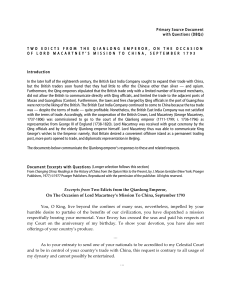
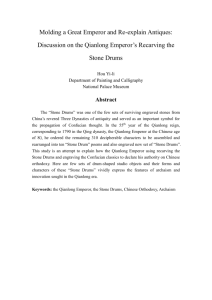

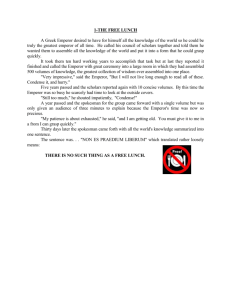
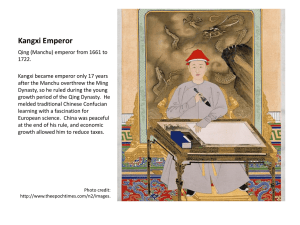
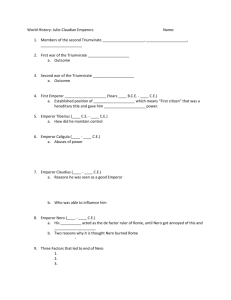

![Procopios: on the Great Church, [Hagia Sophia]](http://s3.studylib.net/store/data/007652379_2-ff334a974e7276b16ede35ddfd8a680d-300x300.png)